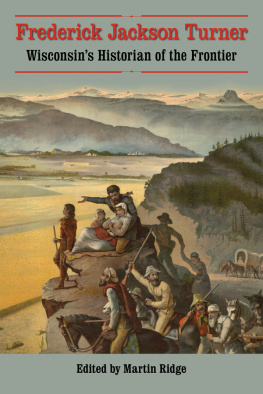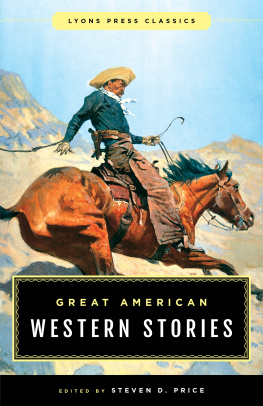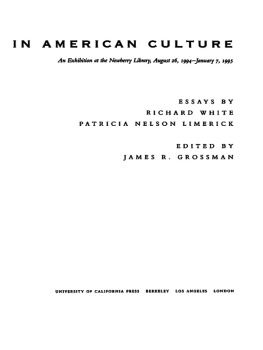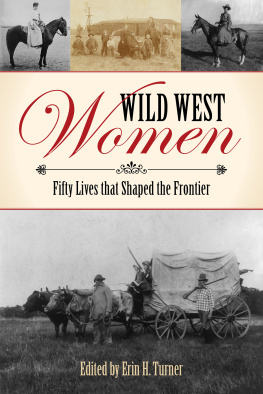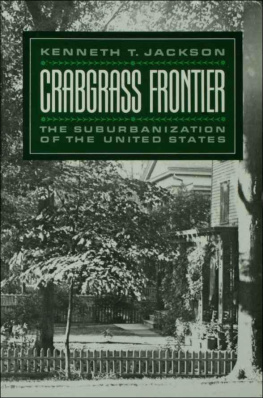Frederick Jackson Turner - The Frontier in American History
Here you can read online Frederick Jackson Turner - The Frontier in American History full text of the book (entire story) in english for free. Download pdf and epub, get meaning, cover and reviews about this ebook. year: 0, genre: Science. Description of the work, (preface) as well as reviews are available. Best literature library LitArk.com created for fans of good reading and offers a wide selection of genres:
Romance novel
Science fiction
Adventure
Detective
Science
History
Home and family
Prose
Art
Politics
Computer
Non-fiction
Religion
Business
Children
Humor
Choose a favorite category and find really read worthwhile books. Enjoy immersion in the world of imagination, feel the emotions of the characters or learn something new for yourself, make an fascinating discovery.
- Book:The Frontier in American History
- Author:
- Genre:
- Year:0
- Rating:3 / 5
- Favourites:Add to favourites
- Your mark:
- 60
- 1
- 2
- 3
- 4
- 5
The Frontier in American History: summary, description and annotation
We offer to read an annotation, description, summary or preface (depends on what the author of the book "The Frontier in American History" wrote himself). If you haven't found the necessary information about the book — write in the comments, we will try to find it.
The Frontier in American History — read online for free the complete book (whole text) full work
Below is the text of the book, divided by pages. System saving the place of the last page read, allows you to conveniently read the book "The Frontier in American History" online for free, without having to search again every time where you left off. Put a bookmark, and you can go to the page where you finished reading at any time.
Font size:
Interval:
Bookmark:
FREDERICK JACKSON TURNER
Introduction by Andrew S. Trees

Introduction and Suggested Reading
2010 by Barnes & Noble, Inc.
This edition first published in 1920
This 2011 edition published by Barnes & Noble, Inc.
All rights reserved. No part of this publication may be reproduced, stored in a retrieval system, or transmitted, in any form or by any means, electronic, mechanical, photocopying, recording, or otherwise, without prior written permission from the publisher.
Barnes & Noble, Inc.
122 Fifth Avenue
New York, NY 10011
ISBN: 978-1-4114-3827-9
INTRODUCTION
W HEN F REDERICK J ACKSON T URNER FIRST DELIVERED HIS ESSAY T HE Significance of the Frontier in American History no one present at the 1893 lecture could have known that he or she was listening to a revolutionary idea that would dominate the historical profession for almost half a century. Turners frontier thesis offered a compelling interpretation of how the frontier played the decisive role in shaping a distinctly American identity. Although recent decades have given rise to a host of critics, Turners thesis lives on not only in the popular imagination but as the starting point for a great deal of contemporary historical investigation. Turners essay is, quite simply, one of the most influential works of American history ever written, and readers still find it an invaluable starting point for thinking about American identity. Although historians have discredited many of its claims, it remains, at the very least, a profound influence on how Americans imagine themselves as individuals and as a nation.
Turner was born in Portage, Wisconsin, in 1861. His parents moved to the state near the end of its frontier period, and this close proximity to frontier life clearly influenced his work. He received his B.A and M.A. from the University of Wisconsin and completed his doctorate at Johns Hopkins University in 1889. He returned that year to teach at the University of Wisconsin and later moved to Harvard University in 1910. He played a leading role in the American Historical Association, serving as its president in 1910 and on the editorial board of the Associations American Historical Review from 1910 to 1915. He retired from Harvard because of ill health in 1924 and died in 1932.
Despite his outsized influence, Turner wrote very little. His fame rests entirely on his essays, many of which were republished in two collections, The Frontier in American History in 1920 and The Significance of Sections in American History in 1933 (for which he was posthumously awarded the Pulitzer Prize). He wrote only one book-length monograph, The Rise of the New West, 18191829, which was published in 1906, but he never managed to complete its sequel (his former students later pieced together The United States 18301850: The Nation and Its Sections and published it after his death in 1935). A number of plausible reasons have been offered for Turners lack of productivity, including writers block, but it seems likely that at least part of the problem was due to a failure, as one biographer put it, to buckle down. He was a social creature and said he needed both daily diversion as well as regular vacations. The ambitious nature of his projects also undermined his efforts to bring them to fruition. Given the relatively small amount of writing he completed, his influence is astounding. Turners reach was extended through his teaching. He spent more than four decades training graduate students, although many of them came to disagree with Turners theories. A number of them went on to have distinguished careers in their own right, including Merle Curti, an American historian who specialized in social and intellectual history, and Herbert Bolton, one of the leading authorities at the time on Spanish American history.
Turner first delivered The Significance of the Frontier in American History at an 1893 American Historical Association conference. He was only a thirty-two-year-old junior faculty member at the University of Wisconsin when he gave his paper in a hot, sleepy lecture room. He began by highlighting the fact that the United States of America no longer had a frontier, according to a recent bulletin of the Superintendent of the Census of 1890, which noted: Up to and including 1880 the country had a frontier of settlement, but at present the unsettled area has been so broken into by isolated bodies of settlement that there can hardly be said to be a frontier line. In the discussion of its extent, its westward movement, etc., it cannot, therefore, any longer have a place in the census reports. That statement helped crystallize ideas that Turner had been thinking about for years. In particular, he zeroed in on the concept of the frontier as a flexible and powerful organizing concept for his thoughts about what was unique in Americas historical development. In his seminal essay, Turner laid out his frontier thesis, which made the frontier the catalyst for the development of a distinctly American national character.
At least part of the appeal of the frontier thesis lies in its simplicity. Traditionally, most historians argued that Americas important institutions derived from English and European sources, and when they did look for the origins of an American character, they focused on eastern groups, such as the Puritans of New England. Completely rejecting the reigning orthodoxy, Turner argued that the crucial element transforming Europeans into Americans was the process of settling the continent. As he wrote in his first paragraph, The existence of an area of free land, its continuous recession, and the advance of American settlement westward, explain American development. He suggestively outlined an evolutionary process during which the primitive conditions of the explorer gave way to a more mature agricultural stage before reaching the complexity of urban, industrial life. For Turner, the key factor in shaping Americas identity was the frontier conditions the pioneers faced as they moved westward. Settling those undeveloped regions, Turner argued, unmoored settlers from their European heritage and made them into Americans. As he poetically wrote, the frontier strips off the garments of civilization and arrays [the colonist] in the hunting shirt and the moccasin.... Little by little he transforms the wilderness, but the outcome is not the old Europe.... The fact is, that here is a new product that is American. This new American was distinguished by a number of characteristics, according to Turner. In the first place, the frontier melded the disparate people who settled in the new world into a composite nationality. These Americans were characterized by distinct traits as well, such as self-reliance, mobility, and optimism. As he wrote more lyrically, The result is that to the frontier the American intellect owes its striking characteristics. That coarseness and strength combined with acuteness and inquisitiveness; that practical, inventive turn of mind, quick to find expedients; that masterful grasp of material things, lacking in the artistic but powerful to effect great ends; that restless, nervous energy; that dominant individualism, working for good and for evil, and withal that buoyancy and exuberance which comes with freedomthese are traits of the frontier, or traits called out elsewhere because of the existence of the frontier. Turner also argued that the most important effect of the frontier has been in the promotion of democracy here and in Europe. He believed that the frontier promoted individualism, which produced an antipathy to control and made Americans vigilant about their liberty.
Font size:
Interval:
Bookmark:
Similar books «The Frontier in American History»
Look at similar books to The Frontier in American History. We have selected literature similar in name and meaning in the hope of providing readers with more options to find new, interesting, not yet read works.
Discussion, reviews of the book The Frontier in American History and just readers' own opinions. Leave your comments, write what you think about the work, its meaning or the main characters. Specify what exactly you liked and what you didn't like, and why you think so.



